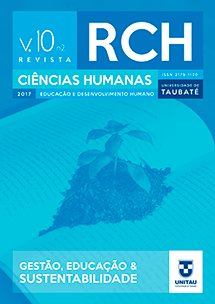USO DO ROBÔ ESCOVA PARA A INICIAÇÃO DE CRIANÇAS DO 5º ANO DO ENSINO FUNDAMENTAL NO LETRAMENTO CIENTÍFICO
DOI:
https://doi.org/10.32813/rchv10n22017artigo9Keywords:
Letramento científico. Aprendizagem Baseada em Projetos. Robô Escova.Abstract
Acredita-se que o processo de iniciação de crianças no letramento científico interfere intimamente na formação de adultos capazes do "fazer ciência", ou seja, cidadãos que compreendem a importância da crítica, da curiosidade, das descobertas, dos experimentos e da criação. A presente pesquisa investiga se há a possibilidade de inserir o processo de letramento científico no 5º ano do Ensino Fundamental, despertando a curiosidade pela ciência por meio de atividades instigantes, resolução de problemas e exploração dos fenômenos naturais. Para o andamento desta pesquisa, foi realizado um estudo de caso em Lorena, numa escola da rede privada tendo os alunos do 5º ano do Ensino Fundamental como público alvo, utilizando como metodologia de ensino a Aprendizagem Baseada em Projetos (ABP). Ao decorrer do presente trabalho, pode-se observar a discussão sobre conceitos de artes, matemática, ciências e física que não estão presentes no currículo do 5º ano, no entanto, os alunos demonstraram facilidade em sua compreensão, pois foram apresentados de maneira contextualizada e motivadora. Mediante análise dos dados levantados verificou-se que tarefas pedagógicas associadas a propostas instigantes devem ser utilizadas com crianças do 5º ano do Ensino Fundamental, pois despertam a curiosidade e emergem o protagonismo de cada educando.
Metrics
References
BARROSO GUEDES-GRANZOTTI, R. et al. SITUAÇÃO-PROBLEMA COMO DISPARADOR DO PROCESSO DE ENSINO-APRENDIZAGEM EM METODOLOGIAS ATIVAS DE ENSINO Problem-situation as a trigger of the teaching-learning process in active teaching methodologies. Nov-Dez, v. 17, n. 6, p. 2081–2087, 2015.
BOAVIDA, A. M. D. R. DE L. Resolução de Problemas em Educação Matemática - Contributo para uma análise epistemológica e educativa das representações pessoais dos professores. [s.l.] Universidade Nova de Lisboa, 1993.
BRASIL. Brasil no PISA 2015 : análises e reflexões sobre o desempenho dos estudantes brasileiro. São Paulo: Fundação Santillana, 2016.
CUNHA, R. B. Alfabetização científica ou letramento científico? Interesses envolvidos nas interpretações da noção de. Revista Brasileira de Educação, v. Volume 22, n. No 68, p. 169–186, 2017.
KNOLL, M. D. The project method: its vocational education origin and international development. Journal of Industrial Teacher Education, v. 34, n. 5, Spring 1997.
LEMKE, J.L. (2006). Investigar para el Futuro de la Educación Científica: Nuevas Formas de Aprender, Nuevas Formas de Vivir, Enseñanza de las Ciencias, v.24, n.1, 5-12.
OCDE (2016). PISA 2015 Assessment and Analytical Framework: Science, Reading, Mathematic and Financial Literacy. Paris: OECD Publishing. 2016
SASSERON, L. H. Alfabetização Científica no ensino Fundamental: Estrutura eIndicadores deste processo em sala de aula.Tese – Faculdade de Educação da USP, São Paulo, 2008.
SOARES, M. Letramento: um tema em três gêneros. Belo Horizonte: Autêntica, 1998.
VENTURA, M. M. O Estudo de Caso como Modalidade de Pesquisa The Case Study as a Research Mode. Rev SOCERJ, v. 20, n. 5, p. 383–386, 2007.
YIN, Robert K. - Case Study Research - Design and Methods. Sage Publications Inc., USA, 1989.
Downloads
Published
How to Cite
Issue
Section
License
The publications of the Human Sciences Journal are registered under the Creative Commons Attribution CC-BY license.
1. The contents of the manuscripts are the exclusive responsibility of their author.
2. It is allowed the total or partial reproduction of manuscripts published in the journal, provided that the source is cited.
3. When submitting their manuscript to the Journal, the authors certify that they are of their own authorship and unpublished (not published in any digital or printed media).
4. The copyright of the articles published in the Journal are of the author, with first publication rights reserved for this journal.
5. For disclosure purposes, the Journal may replicate the works published in this journal in other media, such as social networks (Facebook, Academia.Edu, etc.).
6. The Journal is of public access, therefore, the authors who submit manuscripts agree that they are of free use.
7. In case of any illegality, fraud, or other attitude that puts in doubt the honesty of the publication, especially the practice of plagiarism, the manuscript will be automatically rejected.
8. If the manuscript has already been published, it will be immediately removed from the base of the Journal, its citation linked to the Journal will be prohibited and the cancellation of the referred publication shall be reported in the next issue of the one in which the article was published. In case of the procedure for the withdrawal of the paper the authors will be informed beforehand, being guaranteed the right to a broad defense.
9. The personal data provided by the authors will be used exclusively for the services provided by this publication and will not be made available for other purposes or to third parties.





